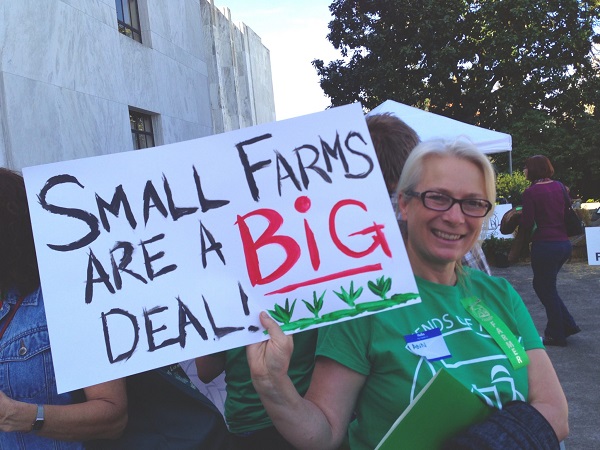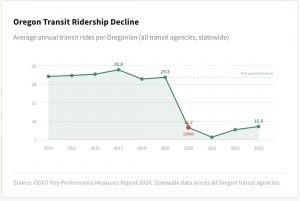Friends of Family Farmers share 2025 legislative priority
7 min read
Curtis Blankinship: Friends of Family Farmers advances programs and policies that protect, promote, and sustain resilient and economically viable community agricultural systems in Oregon. Their formal members encompass about 10,000 acres of grazing land in our state.
[00:00:14] According to Alice Morrison, co-director of policy and development of Friends of Family Farmers, holistic management, adaptive management systems, (adaptive) multi-paddock grazing (AMP grazing), all of these kinds of grazing have become part of the regenerative livestock movement in the last several decades are tied to Indigenous practices and natural systems that have existed for thousands of years.
[00:00:39] Friends of Family Farmers is an advocacy organization trying to push our state government into a position where they’re supporting this type of agriculture at least as much as they are supporting conventional systems.
[00:00:52] Oregon has the potential to rise up and create not only really vibrant ecosystems but also really vibrant local food economies. Bringing those two things together is something they do through their Oregon Pasture Network.
[00:01:04] There’s a reason that we have the dominant agriculture system that we have in this country. The federal government has been investing in that type of agriculture as well as the infrastructure surrounding it. The slaughter and processing system in our country determines what kind of agriculture we are allowed to have.
If you have to have your meat processed in a certain plant inspected by a certain government agency in order to legally sell that meat to the public, that plant has the ability to determine which farms thrive and which farms do not. There are economic disincentives for those plants to work with small independent producers in the current system.
[00:01:38] Right now, according to Morrison, four companies control more than half of the chicken processing capacity in the (United) States: Tyson, JBS, Perdue, and Sanderson. Seventy percent of the pork processing capacity is controlled by four companies: Smithfield, JBS, Tyson, and Hormel, and 75% of the beef processing capacity is controlled by four companies in the U.S.: JBS, Tyson, Cargill, and National Beef. More than half, in some cases, three-quarters of the ability to bring a product to market is controlled by very few companies.
[00:02:13] The way that these contracts function is that they also determine your feed sources and how you’re allowed to raise your animals. You’re entering into a contract for the practices that you’re using and the system that they’re creating for the uniformity of their product.
[00:02:27] If you choose not to be part of that vertically integrated system, to farm in a regenerative manner or be an independent producer, your options for legally bringing a product to market are much smaller.
[00:02:37] Oregon has something called the State Meat Inspection Program. Right now most of the processing capacity in this state is USDA federally inspected.
There are only 13 facilities in this entire state for all of the farms that you raise animals. That means that there’s very little capacity for new farmers and small farmers; 12- to 18-month wait times to bring their product or their animals in to be processed in order to sell that product means they’re making their appointments before their animals are even born in many cases.
Those facilities have a disincentive to work with small farms producing for a certain type of customer who wants to know exactly how their animal was raised.
[00:03:15] Because of the amount of traceability and labor that is required to work with a small producer, corporate facilities have to change out their processing capacity and labeling. This creates a disincentive to work with a small producer over someone who’s bringing them truckloads on a regular basis, which is what the contract system creates.
[00:03:32] The State Meat Inspection Program represents an alternative to the USDA inspection system. Friends of Family Farms worked with legislators to get this program authorized in 2020 because if we lose only one processing facility, there could be a risk of what the USDA calls depopulation. It’s what you think it is.
[00:03:52] I spoke with Alice Morrison at this year’s Eugene Environmental Film Festival. You can slaughter your own meat, but even the neighborhood butcher can’t sell meat that hasn’t been inspected.
[00:04:04] You’re more worried about and the small processors than the big processors is just that, you know, there’s demand side and supply side. So if people saw their meat being butchered in front of them, which they don’t even see that anymore.
[00:04:20] Alice Morrison: Yeah, and I think that that is really important to like make sure that people are making the connection between where the food is coming from and how it gets from the field to your fork. And I think that the thing that makes it a little bit different with this type of inspection is that this is not a retail inspection.
[00:04:38] These inspectors have to be present for any action to happen and they have to be present the entire time. So it’s a different level of inspection that has to happen because many retail facilities are inspected on a twice a year basis. They do spot checks, but with this type of position that we’re trying to fill, those folks literally have to be present for any slaughter to happen.
[00:05:05] So that is really the bottleneck in the USDA system is that those positions are not funded well enough, they’re not attractive because they’re not paid very well, and it’s created a real lack of capacity in people being able to turn on their machines and operate at a way that would make them profitable, which for a slaughter facility that requires so much safety equipment, so much expensive specialized equipment, and so much like cold storage and food safety handling, those margins are very small.
[00:05:34] So we want to make sure that we’re honoring the work of the farmers and also providing a way for the capacity that the state has worked so hard to build to not fall on its face in the final hour.
[00:05:47] Curtis Blankinship: But are they more restrictive to you than they are to the corporate—to Cargill and Hormel?
[00:05:53] Alice Morrison: I would say that all of the processing standards are the same. There is a USDA standard that the state inspection program does have to meet. It’s the same safety standards. It’s just that we have more of control over how many people and who does it and all of those things.
[00:06:10] But so the reason that it’s harder for a smaller producer to access that is truly economies of scale like that is really what we’re talking about here because if I am bringing you ten head of cattle at a time and I’m only bringing him to you like at three times throughout the year I am not considered like a bulk customer and then it takes much more of their staff capacity to make sure that like, ‘This exact carcass is my carcass,’ versus the capacity of the whole day.
[00:06:41] Curtis Blankinship: They’re inspecting it by lot (exactly), and so now they have more lots to inspect (exactly, yeah, and so there there is that economy) They need more staff. Yes, and yeah, and so that’s the issue that you’re trying to change with the legislation is get funding for this staff that is needed.
[00:06:57] Alice Morrison: Yeah, and so really what happened here is that the the governor’s budget only allowed for a 1% increase in continuing service level funding for all state agencies this year or the governor’s agency- requested budgets which turn into governor requested budget which goes to the legislature for approval but the governor made a mandate that agencies could only ask for 1% increases.
[00:07:19] Because these are new positions and ODA (Oregon Department of Agriculture) is a fee-based agency and doesn’t receive very much general funds there was no room for any new positions at ODA. They are only doing technical upgrades because they only have about $500,000 of increase they’re allowed to ask for from last year’s budget to this—or last biennium’s budget to this biennium’s budget.
[00:07:41] So they’re not putting any new positions into continuing service level. And so that meant that even though these facilities that they’ve invested in are just now coming online (and it’s been a very slow process), they were not able to close the loop and ask for the positions that they need now to bring it to the next stage.
[00:07:59] Curtis Blankinship: Right, so these are high-paying jobs though, so these are career jobs.
[00:08:03] Alice Morrison: Yeah, these are career jobs.
[00:08:03] Curtis Blankinship: But how does it affect the price of meat? I mean, we may have to pay a little bit more for sustainably sourced meat.
[00:08:08] Alice Morrison: So this state program has no fees to participate. It’s just a legal requirement that you have to have the inspector there, but the facilities don’t pay for the inspector. So that it doesn’t have an increase in the supply chain costs. It’s just a legal requirement for food safety.
[00:08:22] Curtis Blankinship: Well, so our tax dollars pay for these inspectors. Yes, there’s nothing, whatever they can stop doing something else that we don’t want to pay for it.
[00:08:32] Alice Morrison: Yeah, food safety is very important in the meat sector, especially.
[00:08:35] Curtis Blankinship: That would necessarily be an increase in taxes right from this.
[00:08:37] Alice Morrison: No, we don’t anticipate that that’s true. We’ve spoken to the agency and to legislators who have a very good look at the fiscal outlook for the next biennium, and we think this fits into general funds just fine.
[00:08:50] Curtis Blankinship: Please check out OregonPastureNetwork.org and FriendsOfFamilyFarmers.org if you would like to find a farmer who aligns with your values you’d like to support. For KEPW News, I’m Curtis Blankinship.
Image courtesy Friends of Family Farmers website. This story is published under the Creative Commons license CC BY-ND 4.0, which allows you to copy and redistribute the material, even commercially. You may not distribute modifications if you remix, transform, or build upon the material.







